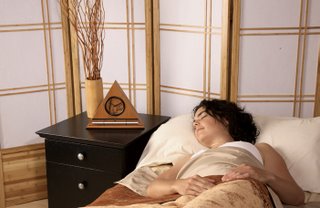
solving problems in your sleep
Text by Louisa Kamps
There’s a huddle of beefy thugs butchering a wolf at the base of a glassy tower that I must enter. The butchers turn from their prey, snarling, to chase me, but I manage to sneak in through a secret back door.
I race to the top floor, where an editor I respect hands back the tall cup I’ve been making smoothies in lately, pronouncing my most recent concoction bland and obvious.
I’m stung but can’t help noticing she’s managed to choke down the last drop.
Now, what to make of a dream like that? Part of me shies from supposing it has any deep meaning. Therapeutic dream analysis has become something of a punch line in this post-Freudian age. (So, doc, I was paddling around in a canoe when my father handed me a giant dagger….)
Then there’s the theory espoused by prominent neurologists since the late 1970s: Dreams are just physiological reactions to stimuli from the nervous system as our brains rest and digest the remains of the day.
Still, I can’t help thinking that this wacky night theater I’ve created must be doing something important.
There’s still so much we don’t know about dreams — like what causes them in the first place — but we may soon begin to unravel the mystery. Thanks to intensified efforts to understand what causes sleep disorders and determine how we can treat them, a growing body of research has recently converged to show that dreams not only help us consolidate new learning and think more creatively, but also recover more quickly from life’s emotional slings and arrows.
Anatomy of a Dreamscape
We typically spend more than 25 percent of our sleep time in a state conducive to dream weaving. As we drift off and enter stage 1, the light phase between sleep and waking, eye movement and muscle activity begin to slow.

what do dreams mean?
From there we move through stages 2 and 3, progressively deeper phases in which breathing and brain waves continue getting slower. About 90 minutes in, we’ll return to lighter sleep before suddenly moving into the phase known as rapid eye movement, in which most dreaming occurs.
We’ll cycle between REM and deeper sleep three to five times during the night, each time staying longer in dream-conducive REM.
During REM sleep, some of the physical and cognitive abilities that serve us so well in waking life fall away: Our muscles go slack to keep us from acting out on our dreams; parts of the brain’s prefrontal cortex responsible for decision-making become less active; the hippocampus, involved in recalling details of recent events, is less active too.
At the same time, the entire midsection of the brain — the region associated with emotion, including the amygdala, which assesses threats and triggers adrenaline — lights up. And in this alternate state of consciousness, during which we’re blind to the real world’s distractions yet flush with vivid imagery and strong feeling, our brains are sifting through new information, searching for ways to integrate it into what we already know and lay the important parts down permanently in memory.
Solving Problems in Your Sleep
In a series of studies looking at dreams’ impact on creative problem-solving, Sara Mednick, an assistant professor of psychiatry at the University of California, San Diego, has shown that naps including periods of REM (which we usually reach after about 50 minutes in an afternoon snooze) have significant cognitive benefits, repeatedly beating out caffeine as a secret weapon in mental performance tests.
In a paper she copublished last year, Mednick described giving subjects a creativity task in which they were asked to come up with a fourth word connected to three seemingly unrelated words. (For instance, “coin,” “quick,” and “spoon,” where “silver” is the missing link.)
Subjects took a test in the morning, then rested quietly before taking another test in the evening. Those who slept but didn’t fall into REM showed no improvement on their second test. But those who did get REM sleep scored 40 percent higher on the evening test than they had in the morning.

solving problems in your dreams
To Mednick, this suggests that dreaming — when the becalmed hippocampus slows its efforts to relay rote, “explicit” information (which is consolidated in deeper, slow-wave sleep) — is the perfect workshop for making more abstract associations between facts and ideas already established in unconscious memory.
“REM allows us to take bits of information, de-emphasize the details of how the world works, ” she said.
Whole Living, November 2010

gentle wake up clock with chimes
Now & Zen Chime Alarm Clock Headquarters
1638 Pearl Street
Boulder, CO 80302
(800) 779-6383